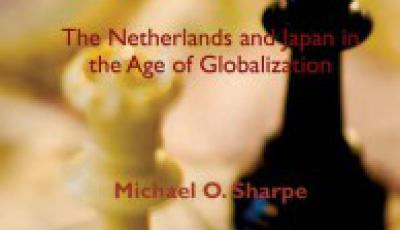Book Review: Postcolonial Citizens and Ethnic Migration: The Netherlands and Japan in the Age of Globalization
Posted:
Time to read:
Guest post by Jonathan Paul Katz, candidate in the MSc Migration Studies programme at the University of Oxford. His research interests include the intersection of diaspora groups (Jewish and Chinese primarily) and the built environment in Commonwealth countries, particularly South Africa. Jonathan is also interested in constructions of whiteness in these contexts and that of Scandinavia, as well as the intersection of international migration and urban planning.
Review of Postcolonial Citizens and Ethnic Migration: The Netherlands and Japan in the Age of Globalization by Michael O. Sharpe (Palgrave Macmillan, 2014).

Sharpe first introduces the migrant groups in question. Antilleans from the Dutch colonies in the Caribbean number approximately 150,000 in the Netherlands, coming from the three islands of Aruba, Bonaire, and Curaçao. Though Dutch citizens, they are termed niet Westers allochtoon (non-Western foreigners) in Dutch society for their largely non-white racial status, and Caribbean cultural heritage. Ethnic Japanese immigrants, on the other hand, source largely from Brazil and Peru and settle in Japan under a special labour-oriented visa especially for Japanese-descent Latin Americans seeking work in Japan. Not citizens, these migrants number around 370,000 and settle mostly in larger Japanese cities. Both groups occupy privileged legal statuses vis-à-vis other immigrants. Both have also migrated to countries that have long perceived of themselves as homogenous and closely tied with a reified national identity.
Once there, however, these migrants do not necessarily feel integrated, nor are they able to access privileged positions in the labour market as “normal” “co-ethnic” citizens. Sharpe takes particular note of the lack of civil organization and participation in the destination environments, despite coming from active and lively civic cultures “at home.” This limitation is also contextualized in a lack of “political transnationalism”―in other words, the creation of a border-crossing political culture among said migrants. Furthermore, Sharpe contextualizes the difficulties of Antilleans in the Netherlands and dekasegi in Japan in the context of political narratives of national protection, reified Dutch and Japanese identities, and wider anti-integration mechanisms in both countries.
This book offers both a useful cross-national analysis of political and cultural transnationalism among legally privileged migrant groups and a useful check on certain celebrated Dutch and Japanese identities still filtered through a methodologically nationalist academy. Firstly, Sharpe offers a critical and nuanced view of civic participation and effects thereon among migrant groups, particularly those considered to be “ideal for participation” or given legal advantages by the states. His analysis of how both groups end up outside of much of civic culture thus offers us clues into how race and nationhood can exclude groups often thought of as “insiders” from much of political life. Secondly, both Antilleans and dekasegi have often been excluded from the transnational sphere due to their single citizenship or ethnic status. However, Sharpe places both groups inside a very applicable transnational framework, which also raises new questions over the bounds of transnational activity. Finally, both the Netherlands and Japan have long been treated as countries operating at the face value of their promoted national identities―be it the “tolerant” “liberal” Netherlands or “homogenous” “non-immigrant” Japan. Sharpe, in using the two cases to critique both the gaps in Dutch “tolerance” and Japanese “homogeneity,” undoes these paradigms in novel ways.
Although highly comparative and certainly well within a global context, the book’s material is weighed heavily towards the Dutch case,which brings both advantages and drawbacks to the analysis. On the one hand, the case study of the dekasegi in Japan unveils new narratives and aspects of the Netherlands’ ultimately nationalist and not fully liberal policies. Furthermore, the contrast calls into question ideas of Dutch statehood and identity―the idea of “feeling Dutch,” or “being Dutch,” and how the Antilleans fall outside these categories. In addition, the comparative framework undoes the Western-centric analyses often used for the examination of Dutch migration patterns. However, in some cases the weight on the Dutch case also reveals potentialities not met in the analysis. The reader may be left wanting more contextualization in other colonial and post-colonial Dutch migrations such as for instance the Surinamese and Indonesians. Furthermore, the racial framework of the Netherlands is not addressed in its entirety. Most Antilleans are non-white; most “Dutch” autochtonen are. Though often conceived of as a non-racial country, race is a very strong factor in much of Dutch political life, and the ties between whiteness and “Dutch” identity remain somewhat unquestioned, though by no means celebrated.
Overall, this work offers a valuable exploration of ethnic- or nationality-based privileged legal migration mechanisms. The book is certainly recommended reading for anyone interested in post-colonial and ethnic migration regimes, as well as those interested in the civic participation of migrants more broadly.
Any comments about this post? Get in touch with us! Send us an email, or post a comment here or on Facebook. You can also tweet us.
__________
How to cite this blog post (Harvard style):
Katz, JP (2015) Book Review: Postcolonial Citizens and Ethnic Migration: The Netherlands and Japan in the Age of Globalization. Available at: http://bordercriminologies.law.ox.ac.uk/postcolonial-citizens/ (Accessed [date]).
Share:








